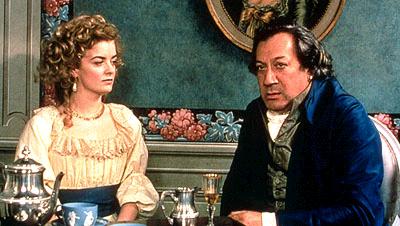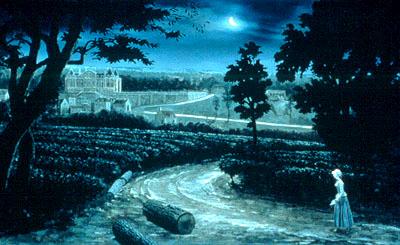The Lady and the Duke
(L'Anglaise Et Le Duc)


In the world of foreign cinema, nobody does pretentious talky films like the French, and of the French, nobody does it better than Eric Rohmer, legendary octogenarian auteur. Some consider his films nothing more than long conversations, and this one is no different. In addition, Rohmer's (Autumn Tale, A Summer's Tale) spare use of sets and camera work make the film look like it a transplant from the stage. The Lady and the Duke is actually adapted by Rohmer from Grace Elliot's Journal of My Life During the French Revolution. Elliot (1760-1823) was a British expatriate living in France during the turbulent revolutionary years, brought there by the Duke of Orleans. In her past life in Britain, she was a mistress of the Prince of Wales, who later became King George IV. A working knowledge of French history makes the film much more palatable, but if that's missing, just look at the pretty pictures.
The Lady and the Duke is notable for the spectacular outdoor scenes. If they look fake, it's because they are. Rohmer commissioned Jean-Baptiste Marot to paint a number of exterior shots, then digitally inserted his actors in them. The result is amazing. All of the outdoor scenes look surreal, as if there are actors walking around in a lush, historical painting. It takes a moment to get used to, but the overall effect is stunning. For a moment, it feels as if one is watching some elaborately animated film. The interior sets are just as intricate. There are only a few, but they all demonstrate the elegance and waste that typify the aristocracy in France at the time.
Elliot (Lucy Russell, Far From China, Following) once had a relationship with Philippe, the Duke of Orleans (Jean-Claude Dreyfus, Philosophale, Un Noel de Chien), but now they are friends. Orleans serves as sort of a protector for Elliot, warning her of imminent dangers from the populace. Rohmer's adaptation takes place at specific points in time from 1790 to 1793, where Elliot had to rise above the typical duties of a lazy aristocrat and try to affect change. An avowed monarchist, she freely expressed her views, and this got her in trouble as the Revolution progressed. The Elliot character always faced an internal struggle on how she should act as her world collapses around her. The middle class is rebelling, but she still lives in her large manor with her servants.
As the events in France progress, the relationship between Elliot and Orleans changes. Orleans is a pragmatist and somewhat of a coward; he shifts his alliances to whatever side seems to be winning, and this puts a rift in their friendship. All in all, it's two rich people doing a lot of talking, and it's enough to put some people to sleep. Especially if words like Jacobin and Robespierre mean nothing to them. Russell does come off as strong, much stronger than Dreyfus, who plays Orleans as slimy and squinty-eyed. They are both good performances, elegantly structured and precise. A little too precise. Much of the film is devoid of emotion, and as a result, some of the dramatic tension that Rohmer is hoping for never materializes.